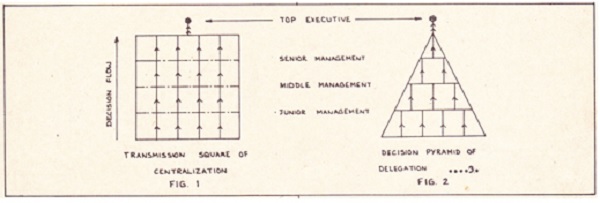Dec 22, 2025
Dec 22, 2025
by BS Murthy
Centralization is a method of management wherein decision-making powers are concentrated by an individual at his source in an organization. If that individual happens to be the structural head, then, as illustrated below, the core of the organization itself becomes centralized.

However, if delegation is practiced at the apex level, but not followed down the managerial pyramid, a mixed organizational set-up emerges. In spite of the fact that so much theory has evolved about the desirability to delegate, what we often come across in practice are but centralized administrative systems, in varying degrees that is. An attempt is made here to analyze the situational aspects and the psychological constraints that lead to centralization and their inimical effects on various facets of such an organization.
In its nascent state, the nature and scope of the organization is such that it may require effective centralized control for functional clarity and organizational efficacy. Thus, centralization in the initial stages of organizational development may, indeed, be desirable for the decision-making pertains to the policy and planning in large measure. Moreover, the nature of the decisions involved will be fundamental in character, which will set the organizational goals and shape its functional ethos.
Further, at the outset, owing to its limited manpower and the accommodative spirit engrained in that close-knit set-up, an organization would be endowed with functional flexibility. Besides, as is more likely, an urge to give, rather than take, prevails among the enthusiastic members, who tend to visualize their personal well-being in the organizational expansion. It’s thus, the zeal to build an organization enables its members to make their personal egos subservient to that of the supremo, as a consequence of which centralization does not prejudice the organizational morale, which normally is associated with decentralization. In a way, the general sentiment is driven more by future expectations than rooted in the current constraints, which, besides acting as a tonic to the organizational growth, provides succor for their personal egos.
But as the organizational growth entails its operations to become varied and complex, it needs more than gut feeling for effective decision-making. True, the bulk of the work may be routine that can be handled effectively by laying down the policies and procedures, but given the complexities of modern organizations what with varied operational features to contend with, the related decision-making calls for relevant competence to be on the right side of the growth track. The complexity and the copiousness of the decision-making process in modern organizations are such that they not only outstrip an individual’s on-job time but also go beyond the realms of human comprehension, however genius one may be.
Moreover, the old guard, having all along subsumed its ego in organization interests, begins to expect ego satisfaction in its office-life that only the delegation of administrative powers affords them. Besides, in the wake of the organizational growth come new recruits with acquired expertise that can only be tapped in a decentralized set up for its functional good. Hence, not only the reformed human bonding within but also the ‘fresh’ administrative blooding from without would necessitate decentralization of its functioning. Though decentralization thus appears to be both logical and rational, three psychological barriers, the impediments for change can be identified.
To begin with, it’s the force of habit. The uniflow working habits of centralization make one feel at a loss to adjust to the multi-flow working culture of decentralization. It is as if one’s work-cup would not be full even at the end of an overworked day under in any dispensation other than centralization. And for another, the varying functional styles of others make the practitioners of centralization wary of decentralization because they come to believe in the impeccability of their own methods. Thirdly, as decentralization mentally dethrones the supreme head from his egocentric throne, which he has come to psychologically occupy, the reluctance for change is all the stronger on this account.
We shall now proceed to examine the functional impediments of centralization and the psychological fall-out of it on the morale of the rank and file of the organization.
Functional Impediments

The figures above illustrate the functional features of a centralized set up vis-à-vis decentralized one.
One may appreciate that any decision-making comprises of two elements - the decisions pertaining to the policy and planning that originate at the apex and those matters related to the day-to-day functioning, which, naturally, permeate every layer of an organization. As centralized set-ups entail ‘seeking’ upward and ‘receiving’ downward, implied are functional delays. Thus, as illustrated in the ‘Transmission Square of Centralization” (Fig. 1), the functional area of exposure and the variety of issues referred to the top management in a centralized set-up, where every manner of matter is brought under its over strained scanner. More so, policy and planning become the major casualties, mixed up as they are, with the humdrum affairs at the apex of the organizational pyramid. What’s worse, the ‘competent authority’ may or may not have the time or inclination, and /or both to grasp the nitty-gritty of the subject matter on the table, and thus the ‘decisions’ so taken tend to be ad hoc, even faulty, which are detrimental to the organizational well-being.
However, wherever delegation of powers exists, in a smooth managerial progression, varied decision-making get varyingly entrusted at various levels of the organizational pyramid so that very few of them come to need the weighty mind of its top head. Thus, various managerial positions in a decentralized organization carry positional responsibility and managerial authority as underlined by the firm lines used to represent their respective functional positions in the “Decision Pyramid of Delegation” in (Fig.2). Juxtaposing the same, in a centralized set-up, they have only a notional value without a firm base of authority, so sans responsibility, in the organization as represented by the dotted lines in Fig.1.
Thus, the mode of lining in the above figures representing the construction modes of both types of organizational edifices signifies their differing managerial characters - firm and continuous in one and tentative and disjointed in the other.
Psychological Fallout
If the functional impediments that centralization brings in, in its wake, are sufficient to dissuade its practice, then the psychological fallout of it on the rank and file of its manpower can be considered as violative of ‘human rights’.
Generally speaking, freedom of thought, expression, and action, of course, within the confines of the available socio-legal constraints, is considered to be essential to the well-being of an individual. With regard to the fulfillment of the emotional needs of an individual, a fourth factor comes into play, which is the ‘esteem need’. It is significant to note that the fulfillment of an individual’s need for self-esteem is totally unrelated to his or her position in an organization but is entirely dependent upon the way one is able to function in his position.
However, centralization creates a functional environment in which every system and practice tend to satisfy the ego of an individual at the expense of the creative and esteem needs of many that are part of the same. Owing to the lack of morale and motivation in people manning the organization, camaraderie, so vital to the functional efficiency and organizational health, becomes causality in a centralized setting. What’s worse, the organizational constraint to look up for guidance insensibly becomes its bane as ‘passing the buck’ habit. All this would insensibly choke the working atmosphere, making people, depending upon their individual proclivities, either disheartened or depressed.
Nevertheless, all this reinforces the centralist’s conviction about the veracity of centralization. Thus gets the stage set for the perpetration of the system, in the mire of the vicious circle wherein the cause of centralization gives raise to the perceived need of its continuation to the detriment of everyone else. Thus, it’s up to the bosses to cross their habitual barriers to set themselves on decentralization course not only for ‘ease of business’’ but also for ‘ease of living’, theirs as well as their subordinates.
24-Aug-2019
More by : BS Murthy